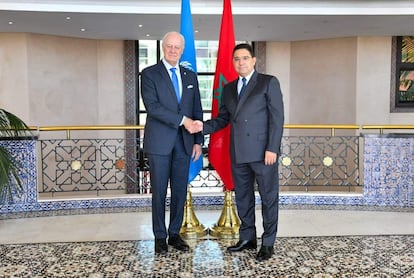
For the first time in at least 20 years, under former special envoy James Baker (1997-2004), a senior UN representative has raised the possible partition of the territory to resolve the Western Sahara conflict, frozen in recent years. and especially as a result of recognition by the presidency of Donald Trumpin December 2020, of Moroccan sovereignty over the former Spanish colony.
Staffan de Mistura, current personal representative of the UN Secretary General for the conflict, proposed this Wednesday to the Security Council – on which Minurso, or the United Nations mission for Western Sahara, and the rest of the international operations depend directly of peace—a plan to resolve a conflict that lasts almost five decades and that it would consist of a partition that would allow “the creation, on the one hand, of an independent state in the southern part (in the Dakhla-Oued Eddahab region), and on the other the integration of the rest of the territory (in dispute) as part of Morocco, with its sovereignty over it recognized internationally.”
The proposal was rejected by both Morocco and the Polisario Front. This, supported by Algeria, claims the territory in its entirety to establish an independent State, De Mistura informed the highest executive body of the United Nations. In a closed-door briefing, of which the first details were known this Thursday, the veteran Italian diplomat recovered the idea of Baker, who was also US Secretary of State between 1989 and 1992, to resolve the dispute, which dates back to to the Spanish abandonment of its former colony in 1975. Since 2007, and especially after the Trump Administration’s support for Rabat’s claims—in exchange for its support for the so-called Abraham Accords, through which Israel signed peace with several Arab countries—Morocco has only offered autonomy under its sovereignty as a political solution to the dispute, while the Polisario Front insists on holding a referendum — a possibility that almost everyone considers dead, despite the fact that Minurso is the acronym for “United Nations mission for the referendum in Western Sahara.” ”—with independence as the end result. Irreconcilable differences over the census remain a case belli between the parties.
De Mistura told the Security Council, according to the Reuters agency, that the UN Secretary General, António Guterres, should reconsider the usefulness of his role as special envoy if there is no progress in six months, which leaves the door open to a possible departure of the diplomat.
In its resolutions, the Security Council has asked the parties to collaborate to find a mutually acceptable political solution to the conflict, while describing Morocco’s autonomy plan as “serious and credible”, yet another setback for the Polisario’s aspirations. . As the autonomy plan gains ground in Western foreign ministries, De Mistura on Wednesday urged Rabat to “explain and expand” its proposal. In July, France became the second permanent member of the Security Council, after the United States, to back Morocco’s sovereignty over the territory. Algeria reacted by withdrawing its ambassador in Paris.
Spain, the former colonial power of Western Sahara, supported Rabat’s autonomy plan in 2022. The Arab monarchies and Israel also support Moroccan sovereignty over the territory, where 29 countries, mostly African and Arab, have opened consulates in what Rabat considers tangible support for its cause and that undermines the dreams of independence of the Sahrawi refugees. in Algeria.
According to the Moroccan digital media The DeskDe Mistura reminded the 15 members of the Security Council his last and very discreet visit, deprived of publicity, to the refugee camps of Tindouf (Algeria). “I have just returned from my third visit to the Tindouf refugee camps, where I was once again struck by the squalor of living conditions and the lack of prospects for a better life. The recent torrential rains and their catastrophic effects in some fields have only worsened the situation,” he explained, while pointing to “the lack of adequate financing and visibility of the situation” as an obstacle to the humanitarian performance of UN agencies. and international NGOs.
Guterres’ special envoy also highlighted the tension between Algeria and Morocco, without diplomatic relations, as “a permanent source of concern that does not contribute to the resolution” of the Western Sahara conflict and, by extension, nor to the desirable regional integration, in a context marked by massive migratory flows and the threat of Islamist terrorism, as well as by Morocco’s often tense commercial relations with the European Union: just two weeks ago, The European Court of Justice overturned the fishing and agricultural agreements of the Maghreb country with Brussels. For Morocco, De Mistura recalled, the 2007 autonomy initiative remains “the end of the game and not the starting point of the process,” in literal words, cited by Guterres’ envoy, the Moroccan Foreign Minister, Nasser Bourita.

